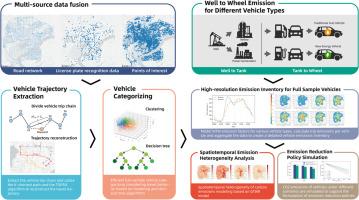Uncovering the CO2 emissions of vehicles: A well-to-wheel approach
IF 6.2
3区 综合性期刊
Q1 Multidisciplinary
引用次数: 0
Abstract
Carbon dioxide (CO2) from road traffic is a non-negligible part of global greenhouse gas (GHG) emissions, and it is a challenge for the world today to accurately estimate road traffic CO2 emissions and formulate effective emission reduction policies. Current emission inventories for vehicles have either low-resolution, or limited coverage, and they have not adequately focused on the CO2 emission produced by new energy vehicles (NEV) considering fuel life cycle. To fill the research gap, this paper proposed a framework of a high-resolution well-to-wheel (WTW) CO2 emission estimation for a full sample of vehicles and revealed the unique CO2 emission characteristics of different categories of vehicles combined with vehicle behavior. Based on this, the spatiotemporal characteristics and influencing factors of CO2 emissions were analyzed with the geographical and temporal weighted regression (GTWR) model. Finally, the CO2 emissions of vehicles under different scenarios are simulated to support the formulation of emission reduction policies. The results show that the distribution of vehicle CO2 emissions shows obvious heterogeneity in time, space, and vehicle category. By simply adjusting the existing NEV promotion policy, the emission reduction effect can be improved by 6.5%–13.5% under the same NEV penetration. If combined with changes in power generation structure, it can further release the emission reduction potential of NEVs, which can reduce the current CO2 emissions by 78.1% in the optimal scenario.

揭示车辆的二氧化碳排放:从油井到车轮的方法
道路交通产生的二氧化碳(CO2)是全球温室气体(GHG)排放中不可忽视的一部分,如何准确估算道路交通产生的二氧化碳排放量并制定有效的减排政策是当今世界面临的一项挑战。目前的汽车排放清单要么分辨率低,要么覆盖范围有限,而且没有充分关注新能源汽车(NEV)在燃料生命周期内产生的二氧化碳排放。为填补这一研究空白,本文提出了一个针对全样本车辆的高分辨率井到轮(WTW)二氧化碳排放估算框架,并结合车辆行为揭示了不同类别车辆的独特二氧化碳排放特征。在此基础上,利用地理和时间加权回归(GTWR)模型分析了二氧化碳排放的时空特征和影响因素。最后,模拟了不同情景下的车辆二氧化碳排放量,为减排政策的制定提供支持。结果表明,车辆二氧化碳排放量的分布在时间、空间和车辆类别上呈现出明显的异质性。通过简单调整现有的新能源汽车推广政策,在相同的新能源汽车渗透率下,减排效果可提高 6.5%-13.5%。如果结合发电结构的变化,则可进一步释放 NEV 的减排潜力,在最优情景下,可使目前的二氧化碳排放量减少 78.1%。
本文章由计算机程序翻译,如有差异,请以英文原文为准。
求助全文
约1分钟内获得全文
求助全文
来源期刊

Fundamental Research
Multidisciplinary-Multidisciplinary
CiteScore
4.00
自引率
1.60%
发文量
294
审稿时长
79 days
期刊介绍:
 求助内容:
求助内容: 应助结果提醒方式:
应助结果提醒方式:


